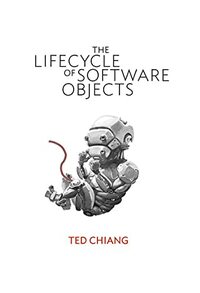Take a photo of a barcode or cover
The only time I dislike Chiang's stories is when he gets too religious (or spiritual if you prefer that term) for my taste. Thankfully "The Lifecycle of Software Objects" isn't one of those cases (in contrast to [b:The Merchant and the Alchemist's Gate|223379|The Merchant and the Alchemist's Gate|Ted Chiang|https://d202m5krfqbpi5.cloudfront.net/books/1266499760s/223379.jpg|216332]). Like all of Chiang's tales this one has plenty of food for thought and a friend of mine would say it hits you right in the ovaries.
For a more substantial review I refer you to people making a living writing them but, really, "The Lifecycle of Software Objects" is so short (and thought-provoking enough) that I don't see the need to spend time on reviews (unless it is your first Chiang, in that case do look around as there are several excellent short stories to chose from). Just read it.
For a more substantial review I refer you to people making a living writing them but, really, "The Lifecycle of Software Objects" is so short (and thought-provoking enough) that I don't see the need to spend time on reviews (unless it is your first Chiang, in that case do look around as there are several excellent short stories to chose from). Just read it.
emotional
reflective
tense
slow-paced
Plot or Character Driven:
Character
Strong character development:
Complicated
Loveable characters:
Complicated
Brilliant and thought evoking. The ending is not perfect, but the story overall really opens up the topic of artificial life.
I've been wanting to read something by Chiang for a while and as soon as I saw the art on the front of this book, I knew i had to read it. Unfortunately, it didn't deliver all that I wanted.
The title is both very apt and misleading. The short novel is about the life cycle of software objects, but more specifically, it's about a set of virtual pets, called digients, which develop artificial intelligence. Most of the book covers how people react to the newly introduced digients and how they get used to them and eventually find them obsolete.
What bothered me about this book was that I could only read it on an intellectual level. There are human characters such as the animator and trainer of the digients, but they didn't feel very personal and even though each digients seemed to have their own personality, I didn't feel emotionally attached to what happened to them. Part of it could be the way the story is told, in a third person, present tense that reads more like an impartial journal article more than a novel, but I think part of it is also a lot that was left unsaid.
The Life Cycle of Software Objects brings up a lot of philosophical questions such as at what point do you call computer intelligence artificial intelligence, and at what point do you treat AI as a human entity including giving it rights over itself. Unfortunately, those points aren't really talked about much and there didn't seem to be many consequences if you went one way or the other in those arguments.
The biggest thing that bothered me was how it just assumed that AI was developed through nurture, and not nature, which seems like a very big assumption to make without many claims. One could say that the whole story is an example of nurture breeding AI, but that's like making a mathematical proof by contradiction and I'm not a big fan of that.
The ending of the book did bring up a question that will bug me for a long time, though. If we're not just walking, massive databases -- if what makes us human is the ability to learn through experience, if we produce AI that can do the same, would we give it the same rights we have?
The title is both very apt and misleading. The short novel is about the life cycle of software objects, but more specifically, it's about a set of virtual pets, called digients, which develop artificial intelligence. Most of the book covers how people react to the newly introduced digients and how they get used to them and eventually find them obsolete.
What bothered me about this book was that I could only read it on an intellectual level. There are human characters such as the animator and trainer of the digients, but they didn't feel very personal and even though each digients seemed to have their own personality, I didn't feel emotionally attached to what happened to them. Part of it could be the way the story is told, in a third person, present tense that reads more like an impartial journal article more than a novel, but I think part of it is also a lot that was left unsaid.
The Life Cycle of Software Objects brings up a lot of philosophical questions such as at what point do you call computer intelligence artificial intelligence, and at what point do you treat AI as a human entity including giving it rights over itself. Unfortunately, those points aren't really talked about much and there didn't seem to be many consequences if you went one way or the other in those arguments.
The biggest thing that bothered me was how it just assumed that AI was developed through nurture, and not nature, which seems like a very big assumption to make without many claims. One could say that the whole story is an example of nurture breeding AI, but that's like making a mathematical proof by contradiction and I'm not a big fan of that.
The ending of the book did bring up a question that will bug me for a long time, though. If we're not just walking, massive databases -- if what makes us human is the ability to learn through experience, if we produce AI that can do the same, would we give it the same rights we have?
One of the best story's i have read in the last 10 years.
As always (at least so far), Ted’s ideas are amazing and unique. I loved the first half of this novella, but for me, it lost steam in the back half. Maybe a shorter form would have been more potent?
challenging
dark
slow-paced
Plot or Character Driven:
Plot
Strong character development:
Complicated
Flaws of characters a main focus:
No
The ending wasn't as well encapsulated as his other works but the true difficulties of producing AI is ever evident in the writing.
Light on story, but heavy on deep thinking into artificial intelligence. Highly rated.
I read this as part of my recent novella kick and really enjoyed it. It was fascinating to follow the entire lifecycle of a virtual reality AI. What happens when competition arises? What happens when their owner gets bored? What happens when the startup that made them goes out of business? What happens when the platform they were built for is no longer supported? It's not a long read, and it's well worth it.



